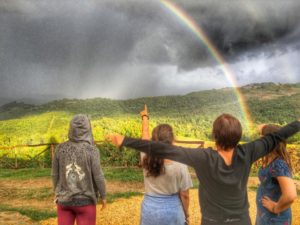By Benjamin Bagocius
I like awkward silences.
They are the unwieldy soul of social interaction. We often labor to exclude rather than befriend their wildness. I want to reclaim awkward silences, to listen for the ways their mysterious voices restore poetry to everyday conversation.
Awkward silences speak the language of poetry. As with poetry, awkward silences can be uncomfortable – but also liberating. They are breaks from habituated responses when something new might happen, supersaturated opportunities to rethink ourselves and each other. Generally framed as the worst possible social interaction, the awkward silence can be one of the most productive moments of our shared, public life. After all, awkward silences are never conditions of solitude. They emerge from encounters between two or more people. Just as poets need readers, and readers need poets, awkward silence, too, is about relationship. This is where its greatest promise lies for reimagining our public life together.
Emily Dickinson likes awkward silences, too. She beautifies an agonizing silence with mismatched rhymes as if saying the wrong thing, awkwardness exemplified:
I like a look of Agony,
Because I know it’s true –
Men do not sham Convulsion,
Nor simulate, a Throe –
The Eyes glaze once – and that is Death –
Impossible to feign
The Beads upon the Forehead
By homely Anguish strung.
Dickinson’s pacing – her stops and starts – makes for an awkward read. Poetry stalls communication with line breaks, dashes, white space, and out-of-place words, catching readers off guard (ahem, Ms. Dickinson. “Feign” does not rhyme with “strung”). And yet, the poem doesn’t work without miscues and pauses. Communication with breaks isn’t broken. Indeed, moving closer to fundamental truths of human being may require incongruity that slows us down. If this pause is productive in the poem, then it can be productive in our social interactions.
Awkward silence manifests not the failure of social encounter, but its open-ended essence. The typical narrative goes that awkward silences show we have little in common. On the contrary, awkward silence is evidence of our common humanity – the unshakable undercurrent of shared susceptibility – that clamps us to one another beneath differences of temperament or doctrine into our glands and cells. Awkward silence is a concentrated pause we share, a hush in public spaces – in the office or at a conference, in a restaurant or at a party –underneath the trumpeting of “either/or” positions, headlines, and issues. Like poetry, the awkward silence slows us down and stretches us beyond our comfort zone into surprising intimacy with another human being, often in public. Averted glances, tied tongues, and rising temperatures of awkward silence return us to a central truth about human being below the noise of ideological codes. Awkward silences are fibers that draw us toward each other, pull us back into difficult, sometimes unwanted, but irrevocable bonds with one another, a reunion with the human family after having been segregated from each other in private camps. “Are we not of interest to each other?,” poet Elizabeth Alexander asks. Our interest in one another holds such immensity we can become bereft of words to describe it.
To be sure, awkward silences can be painful: the aftermath of spilling too much information at the office; the run-in with the ex on the bus; the embarrassment after an offensive remark at a restaurant. Poetry, too, can be painful: it leads us into caverns we may want to avoid in favor of everyday comfort. And yet we rarely encourage avoiding poetry to the degree that we do awkward silence. Poetry enriches our lives by expanding – sometimes jolting us into – empathy, wild imaginings, and interconnectedness. I find that awkward silences do the same thing. As composer Philip Glass has said, “Dissonance and beauty are not that different from each other.”
To rethink this undervalued silence as poetry rather than nuisance opens us to rich deliverances: the delicious liberty from armor of guarded conversation, emancipating us to venture across frontiers of feeling, freeing us to freestyle like amateurs dumbstruck by the surprise that we did not expect to find in each other, letting ourselves and others break open into something difficult, strange, and new. In stumbling through the blank of awkward silence, we move across an empty page inside ourselves and co-write a poem that can neither be paraphrased nor comprehended. We awaken to human encounter as a realm of art constituted by risk – but also overflowing with possibilities.
We all love page-turners, but awkward silence asks us to pause with whatever is right in front of us. Awkward silences, like poetry, give us perspective. They wake us up to notice and reflect upon what we feel. The panic we may feel in awkward silence could be an awakening to our interrelatedness. The loss of control could be the dissolving of ego that blocks entryway into our common humanity. Awkwardness is an unexpected situation of emotional discord. It is equally a physiological transformation, quiet adjustments the body gets an opportunity to pursue, like a bloodhound delighting in a new scent. Beads might appear on foreheads, mouths might crease, blood flows faster, eyes dart, skin warms and softens. We become more alive in one another’s presence, not less so. Much like in yoga – the poetry of the body in motion – the tension between effort and softness enhances pliability and self-reflection. We deepen tenderness for ourselves and others.
Our culture has a difficult time with awkward silence because our culture has a difficult time with uncertainty. Perhaps this is why we fear awkward silences – they expose uncertainty about where we stand in relation to one another. Uncertainty is often translated as ineffectuality in a public sphere where voices count when they shout answers or opinions. Poetry is an antidote to phobias of uncertainty. Poetry is made of instability and beautifies it: recall the white, empty spaces, starts, and stops in Dickinson’s poem. Poetry shifts us and the worlds we move through in unforeseeable directions inaudibly and imperceptibly. The poet W. H. Auden names poetry’s silence its power: “poetry makes nothing happen.” By muscling nothing into existence, poetry clears space wider than answers or comebacks. In poetry, the realm of imaginative, emotional, and physical potential is impossibly massive.
Reading a poem line by line is like inhabiting an awkward silence. We destabilize who we have imagined ourselves and others to be. Room for alternative stories comes in. We descend ladders into consciousness, and stumble through underground caverns, stanza by stanza, journeying into deeper questions about what it means to be human. Poetry teaches us to restrain from jumping to conclusions about ourselves and one another: we can’t see firm landings in the dark. In a poem, we get to exercise atrophied senses, becoming listeners to an underground world, tuning the ear to music seldom heard aboveground: the rhythmic drops of everyday anguishes that never make a peep in everyday goings-on, as quiet as beads strung upon foreheads. Poetry disciplines us to hear this quiet ache in ourselves, and muscles us into tenderness for this place in others. These quiet feats – carving caverns of fellow-feeling – are the nothing that poetry makes. Poetry is therefore civic. It digs underground passageways from one human being to another.
Awkward silences share civic adventurousness with poetry. In awkward silence, we get to come out of the closet as uncertain together. We become athletic listeners to uncertainties out in the open. These public silences frequently emerge from venturing beyond topical safety into depths, experimenting through layers of darkness in broad daylight. When we do not fear awkward silence, we are likelier to share the odd but necessary perspective with those around us, and inaugurate an awkward silence akin to writing a rough draft of poetry that can revise how we might live differently together. Or, when we can linger in awkward silence like in a challenging poem without turning the page, we might withhold a response that could fan the flame of petty opinions that cheapen human complexity. Instead of wondering, “What do I say?”, we can relax into wonder. In awkward silence we practice a new pace. We need not rush toward artificial light of easy solution or quick response. Instead, in thick but openhearted quiet, we get to reflect on our habits, anticipations, and judgments, letting go of expectations that either we or the other person change into something legible. We get to relax into mysteries we never imagined finding in each other.
Making impacts in public spaces, then, can look like something different than taking a side or announcing a stance. The awkward silence shows the ways we impact public life not only with ribald statements or eloquent treatises, but also with the humblest of instruments: a glance, our proximity, our silence. The awkward silence sings the soundless ways we reshape one another’s lives, bend each other’s porous cell walls and regulatory systems to widen empathy, in spite of who we’re voting for, our status at the firm, or our positions on abortion. In this silence, our bare humanity becomes more pronounced than our deepest differences. We shed labels and ranks; our mutual presence charges one another into physiological humility. Standing there doing what may look like nothing, we are in fact changing what “making a difference” in public life can mean far afield from winning an argument or knowing the answer.
We get to carry these realizations with us when we emerge from the silence and turn toward our familiar corners again. We may find their “either/or” edges have become softer, like a forehead strung with beads on strangers stumbling, like us, across dark passageways and tottering over rickety ladders of being human. Poetry is often considered one of the most solitary arts. But in awkward silence, we see one another as fellow poets: we are all writers of interior human poems sketched out in everyday spaces we move through together, in the park or at the office. This soundless drafting and revising, drafting and revising is some of the quietest work we do in the public sphere, and we do it together.
Benjamin Bagocius is an assistant professor of literature at Bard Early College in Cleveland, Ohio. His articles of literary criticism are forthcoming in Modernism/modernity and Criticism , and his public humanities essays have appeared in On Being. Ben is the 2006 and 2010 U.S. Figure Skating Midwestern champion.

Join The Manifestation Retreat: Manifesting Under The Tuscan Sun. June 17-24 OR Sep 9-16. Email retreats@jenniferpastiloff.com or click the picture above.

Join founder Jen Pastiloff for a weekend retreat at Kripalu Center in Western Massachusetts March 3-5, 2017.
Get ready to connect to your joy, manifest the life of your dreams, and tell the truth about who you are. This program is an excavation of the self, a deep and fun journey into questions such as: If I wasn’t afraid, what would I do? Who would I be if no one told me who I was?
Jennifer Pastiloff, creator of Manifestation Yoga and author of the forthcoming Girl Power: You Are Enough, invites you beyond your comfort zone to explore what it means to be creative, human, and free—through writing, asana, and maybe a dance party or two! Jennifer’s focus is less on yoga postures and more on diving into life in all its unpredictable, messy beauty.
Note Bring a journal, an open heart, and a sense of humor. Click the photo to sign up.





No Comments